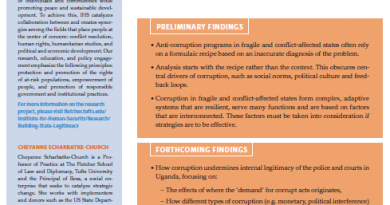Facilitation in the Criminal Justice System
Despite extensive work and resources on corruption in Northern Uganda, the enablers and drivers of corruption, and the reasons corruption has been so resistant to efforts to combat it, have received little attention. This paper is the first in a two-part analysis of these drivers, based on qualitative research conducted on the criminal justice elements of the police and courts in Northern Uganda. It explores how corruption functions in the police and courts, why it persists, and the impact it has on the legitimacy of these institutions.
Read More


